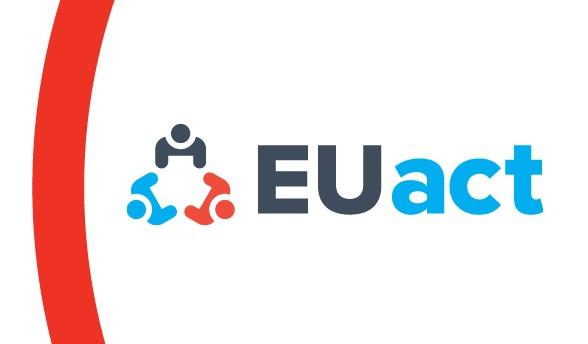#EUsparring 2019: Contest of ideas between EU-candidates (Berlin)

Date: 26 March 2019
Location: Telefónica Basecamp, Berlin, Germany
Participation: 113 participants from 9 countries (Belgium, Germany, France, Great Britain, Slovakia, Switzerland, Pakistan, Poland, U.S.)
EU-Kandidat*Innen im Ideenwettstreit
At the 26th of March, two months before the European election, the Progressive Zentrum hosted the first EU contest of ideas between EU-candidates in the Telefónica Basecamp (Berlin). In three sparring-rounds Damian Boeselager (Volt), Engin Eroglu (FREIE WÄHLER), Hannah Neumann (Demokratie in Europa) and Susanne Zels (CDU) had two minutes to convince the audience of his/her visions for Europe. The sparring- rounds focused on the topics Strengthening the Institutional Democracy, Strengthening the Regions and Strengthening of the Social Cohesion. The evening was moderated by ARD-Journalist Melanie Stein. After each sparring-round there were not only critical questions from the audience but also an online-voting. In this format the candidates get direct feedback from the audience. In addition, it was possible to involve the whole audience and not only isolated voices.
Strengthening of the Institutional Democracy: For minimizing the democratic deficit of the EU, Bianca Praetorius supports a European constitution. Such as Engin Eroglu, she demands more transparency regarding lobbies. Additionally, Eroglu wants to extend the competences of the European Parliament (EP) to all political key-areas. Damian Boeselager and Hannah Neumann also see great potential in strengthening the EP. Boeselager demands transnational elected representatives and Neuman would like to implement a parliamentary right of initiative, -control and -budget. According to Neumann European debates have to get a stronger connection to municipalities and regions. Susanne Zels does not support a federal Europe but the variety of the national identities. Further, concrete manifestos of the European parliamentary-groups could help to encourage EU-debates in the public.
Strengthening of the Regions: Neumann wants to stronger use the European Investment Fund for limiting global warming and for an increased support of structurally weak areas and cross-border projects. For Zels a high employment rate is the key for the support of less favoured regions. She complimented the success of EU-investments in this field but demands a stronger European approach regarding climate politics. According to Boeselager, current challenges can only be solved on the European level. Nonetheless, a strengthened exchange of best practices could support regions and municipalities. Demokratie in Europa wants to invest several billions, with a strong involvement of the citizens, to create the regional basics for an environmental friendly Europe. Different to Volt and Demokratie in Europe, the FREIEN WÄHLER advocate decentralisation, especially regarding agriculture. According to them, decisions should be taken were one can feel their consequences.
Strengthening of the Social Cohesion: Eroglu wants an improved coordination of the labour market policy as well as fair conditions for employees. Thereby the FREIEN WÄHLER wants to fight against wage dumping and social inequalities. Further, tax loopholes have to be closed and administrations have to
become future-oriented. Contrary to Demokratie in Europa, Volt and Bündnis 90/Die Grünen, the party
declines a stronger European integration in the field of social politics. Praetorius and Neumann for
instance demand a European minimum wage. Volt’s goals are an European employment agency as well as minimum standards for social security of everyone. Neumann takes the view that one has to create European minimum standards, for instance with regard to pension and care. She advocates the backstop of cross-border work and a reliable health care. Further, the social rights of the European Charter of Fundamental Rights should be enforceable. Such as the FREIEN WÄHLER, the CDU does not want a common labour- and social policy. Instead Zels wants to improve the work-mobility of everyone, for instance by occupation related foreign language trainings.
The Event is part of the project “EUact. EP Elections and Beyond: Active Participation of EU Citizens at All Levels”. It is organised in cooperation with GLOBESEC (Slovakia), the Higher School of International Relations and Social Communcation (Poland) and the Slavyani Foundatin (Bulgaria). EUsparring was co- financed by the Europe for Citizens Programme of the European Union.
Link to a Description of event in German and photo gallery
Link to Program
Link to Twitter
